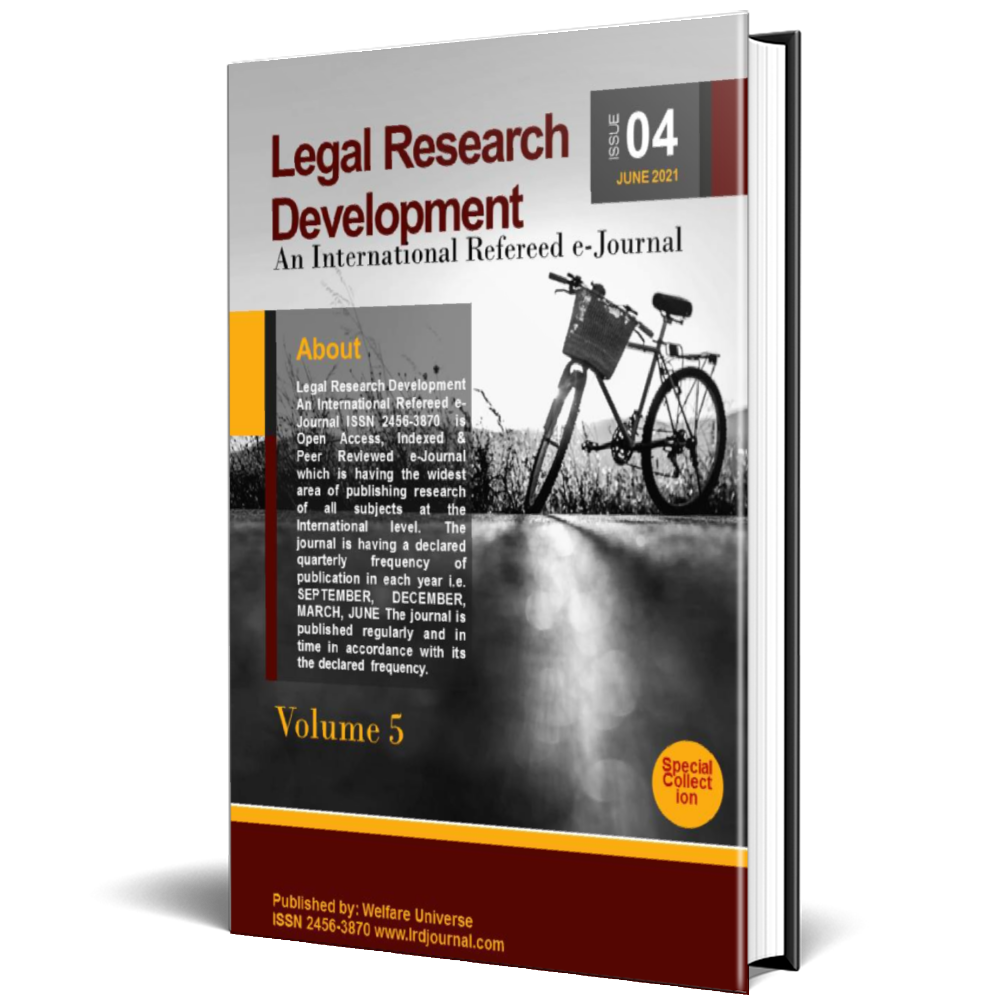Our traditions teach tolerance; our philosophy preaches tolerance; our constitution practices tolerance; Let us not dilute it
DOI:
https://doi.org/10.53724/lrd/v1n4.02Keywords:
TRADITIONS TEACH TOLERANCE, OUR CONSTITUTION PRACTICES TOLERANCE, LET US NOT DILUTE ITAbstract
Sedition law is being talked again. People are filing cases over cases and coming out on street to protest insisting that the accused be arrested immediately in the case of Amnesty International India. Another case has been booked against the Ramya, the ex-Parliamentarian, for making a statement with respect to Pakistan. These cases raise larger questions on free speech and expression in a democratic nation.
References
Constituent Assembly of India - Volume I.
Constituent Assembly of India – Volume-III 29thApril 1947.
Constituent Assembly of India - Volume III 30th April 1947.
Vol. 1, Issue-IV
June 2017
Romesh Thappar vs The State of Madras. AIR 1950 SC 124.
Brij Bhushan vs State of Delhi, AIR 1950 SC 129.
Sedition
Promoting enmity between different groups on ground of religion, race, place of birth, residence, language, etc 9Deliberate and malicious act intended to outrage religious feelings of any class by insulting its religion or religious belief.
Defamation
Whoever, by words, either spoken or written, or by signs, or by visible representation, or otherwise, brings or attempts to bring into hatred or contempt, or excites or attempts to excite disaffection towards, the Government established by law in India, shall be punished with imprisonment for life, to which fine may be added, or with imprisonment which may extend to three years, to which fine may be added, or with fine.
A. Promoting enmity between different groups on grounds of religion, race, place of birth, residence, language, etc., and doing acts prejudicial to maintenance of harmony.—(1) Whoever—by words, either spoken or written, or by signs or by visible representations or otherwise, promotes or attempts to promote, on grounds of religion, race, place of birth, residence, language, caste or community or any other ground whatsoever, disharmony or feelings of enmity, hatred or ill- will between different religious, racial, language or regional groups or castes or communities, or
(a) commits any act which is prejudicial to the maintenance of harmony between different religious, racial, language or regional groups or castes or communities, and which disturbs or is likely to disturb the public tranquility, or
(b) organizes any exercise, movement, drill or other similar activity intending that the participants in such activity shall use or be trained to use criminal force or violence or knowing it to be likely that the participants in such activity will use or be trained to use criminal force or violence, or participates in such activity intending to use or be trained to use criminal force or violence or knowing it to be likely that the participants in such activity will use or be trained to use criminal force or violence, against any religious, racial, language or regional group or caste or community and such activity for any reason whatsoever causes or is likely to cause fear or alarm or a feeling of insecurity amongst members of such religious, racial, language or regional group or caste or community, shall be punished with imprisonment which may extend to three years, or with fine, or with both.
Offence committed in place of worship, etc.—(2) Whoever commits an offence specified in sub-section (1) in any place of worship or in any assembly engaged in the performance of religious worship or religious ceremonies, shall be punished with imprisonment which may extend to five years and shall also be liable to fine.
295A. Deliberate and malicious acts, intended to outrage religious feelings of any class by insulting its religion or reli- gious beliefs.—Whoever, with deliberate and malicious intention of outraging the religious feelings of any class of citizens of India, by words, either spoken or written, or by signs or by visible representations or otherwise], insults or attempts to insult the religion or the religious beliefs of that class, shall be punished with imprisonment of either description for a term which may extend to three years, or with fine, or with both.
People who criticized Jayalalita the Chief Minister of Tamilnadu are being charged for 124A of IPC.
PTI (2010)
JNU Students' Union President Kanhaiya Kumar and Umar Khalid on charges of sedition for organizing seminar on capital punishment to 2001 parliament attack convict
Subject: Case against Amnesty International NGO and United Theological Society College for conducting anti-national activities. With respect to the above subject, in a college near Jayamahal, Miller‘s Road, JC Nagar, Bengaluru, on 13 -8- 2016, Saturday at 7 pm, in connection with Kashmir (Broken Families) some locals in Bengaluru and Kashmiri students residing in Bengaluru and some people had gathered. SindhujaaIyengar, lecturer, political science, private university, Bengaluru and Seema Mustafa, RoshanIllahi, had sung anti-national songs, shouted anti-national slogans, delivered anti- national speeches, against soldiers. They shouted slogans that Indian Kashmir should be part of Pakistan, they also indirectly supported terrorists, Pakistan and ISI, and conducted an anti-national programme. Therefore take immediate action against the people who are in the photo and video and arrest them. When ABVP activists tried stopping these people, they tried assaulting ABVP people. We urge you to take immediate action. Slogans: We will fight till Kashmir becomes independent, Give us freedom, Indian army, Indian Army HaiHai, Gun se lengeazaadi
The Indian Express August 24th 2016 Bangalore/New Delhi
Vol. 1, Issue-IV
June 2017
Speech of Somnath Lahiri, 29th April 1947, Indian Constituent Assembly (Vol.III)
Article 13. (1) All laws in force in the territory of India immediately before the commencement of this Constitution, in so far as they are inconsistent with the provisions of this Part, shall, to the extent of such inconsistency, be void. (2) The State shall not make any law which takes away or abridges the rights conferred by this Part and any law made in contravention of this clause shall, to the extent of the contravention, be void. (3) In this article, unless the context otherwise requires,— (a) ―law‖ includes any Ordinance, order, bye-law, rule, regulation, notification, custom or usage having in the territory of India the force of law; (b) ―laws in force‖ includes laws passed or made by a Legislature or other competent authority in the territory of India before the commencement of this Constitution and not previously repealed, notwithstanding that any such law or any part thereof may not be then in operation either at all or in particular areas. [(4) Nothing in this article shall apply to any amendment of this Constitution made under article 368.]
AIR 955
Balwant Singh Vs State of Punjab AIR 1995 SC 1785.
AIR 1997 SC 3483.
(2015) 5 SCC 1 Para 94.
Downloads
Published
How to Cite
Issue
Section
License
Copyright (c) 2017 Legal Research Development: An International Refereed e-Journal ISSN: 2456-3870

This work is licensed under a Creative Commons Attribution-NonCommercial 4.0 International License.










